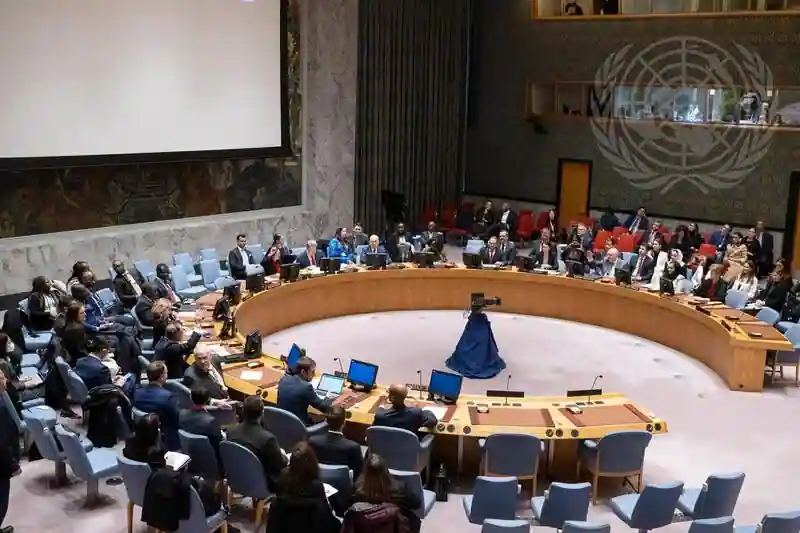On December 21, 2022 the United Nations Security Council adopted its first-ever resolution [ S/RES/2669(2022)] on Myanmar calling for the release of all arbitrarily detained prisoners including Aung San Suu Kyi by Myanmar’s junta and addressing the root causes of the crisis in Rakhine State.
The resolution was proposed by Britain. The text was adopted with 12 votes in favor. Permanent members China and Russia abstained and did not use their vetoes after the wording was amended. India also abstained.
The Security Council, which is made up of 15 members, has been divided on Myanmar for decades and has only been able to issue formal statements about the country, which has been under military control since February 2021.

Key points of the Security Council Resolution on Myanmar
Release Suu Kyi and other political prisoners
The Council urged the Myanmar military to immediately release all arbitrarily detained prisoners, including President Win Myint and State Counsellor Aung San Suu Kyi.
Rakhine State and Rohingyas
The United Nations Security Council has emphasized the importance of addressing the underlying causes of the crisis in Rakhine State and creating the necessary conditions for the voluntary, safe, dignified, and sustainable return of Rohingya refugees and internally displaced persons. The Council has encouraged diplomatic efforts between relevant parties to address the issues facing the Rohingyas, and has emphasized the importance of continuing to provide protection and assistance to refugees and displaced persons. The Council has also decided to remain engaged with the situation.
The resolution’s language does not adequately address the severity of the crisis in Myanmar –Amiera AlHefeiti
Amiera AlHefeiti, the Deputy Permanent Representative of the United Arab Emirates Mission to the United Nations, mentioned that the resolution’s language does not adequately address the severity of the crisis in Myanmar and her delegation wished for stronger language that would tackle the full range of challenges in Myanmar. She requested additional international efforts to address the Rohingya crisis, respond to the worsening humanitarian situation, and create conditions for the voluntary, safe, sustainable, and dignified return of refugees and internally displaced persons.
Support for the ASEAN formula
The Security Council reiterated its support for the ASEAN Special Envoy’s efforts to engage intensively with all relevant parties in Myanmar, with a focus on promoting fully inclusive and representative dialogue. It encouraged close cooperation with the United Nations Special Envoy and urged all parties in Myanmar to work constructively with both Envoys to commence dialogue to seek a peaceful solution in the interests of the country’s people.
Why did Russia abstain from voting on the Resolution on Myanmar?
Vassily A. Nebenzia, the Permanent Representative of Russia to the United Nations, saying that his country abstained from voting, noted that the situation in Myanmar does not represent a threat to international peace and security. Pointing out that the text mainly focused on the human rights situation, he suggested that the Third Committee (Social, Humanitarian and Cultural) would be a better discussion forum. Expressing dissatisfaction with the work of the penholders, who did not strive to agree on a balanced text, he pointed to proposals that were ignored as an indication of the counter productiveness of unilateral restrictive matters. While recognizing that states can have different opinions about the policies of the military Government, he stressed that Council members should not destabilize the situation on the ground and undermine ASEAN’s mediation efforts. Urging all Myanmar political forces to show restraint, he pointed out that the Myanmar military has confirmed its commitment to the Constitutional provisions that establish the timeframe for the state of emergency, with a view towards holding parliamentary elections in 2023. Noting that the resolution is not consensus-based, he said that the Russian Federation decided not to block it, recalling that the only topic on the Council’s agenda on Myanmar should be the situation in Rakhine State.
What is China’s position on the Security Council Resolution on Myanmar?
Ambassador Zhang Jun, the Permanent Representative of People’s Republic of China to the United Nations, pointed out that it would be more appropriate for the Council to adopt a presidential statement, noting that the tone of the text lacks balance. Therefore, China abstained, he said, stressing that there is no quick fix for the Myanmar issue and the solution to the conflict depends on Myanmar itself. The large-scale prisoner release in November by the Myanmar authorities should be recognized and encouraged, he noted, underscoring that ASEAN has a unique advantage in dealing with Myanmar-related issues. He thus encouraged the international community to listen to ASEAN’s views, support its leadership and allow the organization time and space to build consensus. Recalling that the Council unanimously issued 10 outcome documents on Myanmar in 2021, he spotlighted China’s participation and consensus. Reiterating China’s policy of friendship towards Myanmar, he expressed full support for ASEAN and the implementation of the Five-Point Consensus.
Why did India abstain from voting on the Resolution on Myanmar?
Ruchika Kamboj, India’s permanent representative to the United Nations and Council President for December, 2022, spoke in her national capacity to point out that her country shares a long border with Myanmar, along with historic and cultural links with its people. Therefore, any instability in that country directly impacts India, and resolving the current crisis is matter of national security. The welfare of Myanmar’s people remains India’s priority, and she said that the complex situation in Myanmar calls for quiet, patient diplomacy. Any other course will not help resolve outstanding issues and, under the current circumstances, a Council resolution may entrench the parties in inflexible positions — rather than encourage them to pursue inclusive political dialogue. She called on all parties to immediately cease hostilities, abandon extreme positions and initiate an inclusive political dialogue to restore democracy. On that point, she stressed that political leaders should be released and allowed to resume political activities. Adding that it is important to carefully weigh Council action, she urged the organ to consider the interests of neighbouring countries, who will be most affected by instability in Myanmar. In view of these concerns, India abstained from the vote, she said.
‘Resolution lacks strength’: Thomas Andrews
Thomas Andrews, the Special Rapporteur on the situation of human rights in Myanmar, expressed his reaction to the adoption of the resolution saying “The systematic gross human rights violations — amounting to war crimes and crimes against humanity — being perpetrated daily on the people of Myanmar by an illegal military junta requires strong, coordinated action by UN Member States. The demands put forward in the resolution — including ‘an immediate end to all forms of violence,’ the release of political prisoners, the need for unimpeded humanitarian access, and the need to respect the rights of women and children — are critically important but what is missing are consequences for the failure to meet them and the imposition of sanctions and accountability for crimes the military has committed to date.”
He called for the creation of a coalition of nations that are willing to support the people of Myanmar by taking action.
“There are viable options for Member States who are prepared to address this failure, including coordinating sanctions, cutting off the flow of revenue that is financing the junta’s military assaults, an embargo on weapons and dual-use technology and robust humanitarian aid that can reach those most in need, among other measures. What is required is the political will to seize them,” added the Special Rapporteur.







